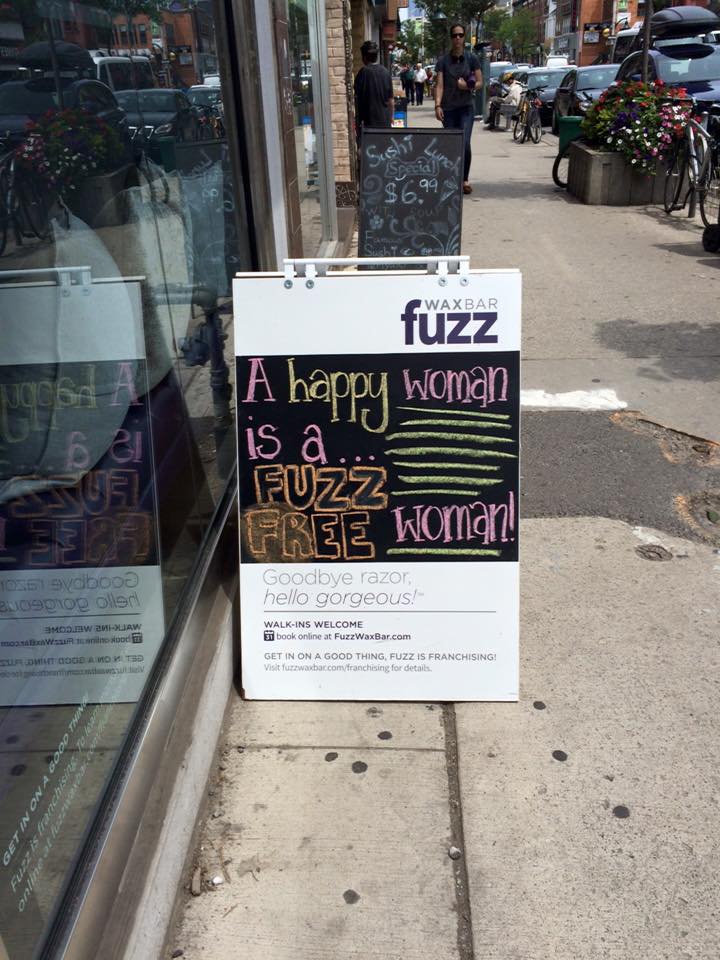Like this article? rabble is reader-supported journalism. Chip in to keep stories like these coming.
Sarah Factor was strolling along Toronto’s Bloor Street. The 26-year-old musician had just returned after living in New York for several years. It was a sunny July afternoon, and she was walking towards a pizza joint to catch up with a friend.
That’s when she spotted Fuzz Wax Bar’s sandwich board.
“A happy woman is a fuzz-free woman,” the salon’s board proclaimed, beckoning local women to come in for facial, body and bikini waxing.
“I saw it and I stood there for a minute,” Factor recalled. “This board is out there for the community to see. I thought, it’s not a place to decide what kind of body a woman should have.”
Fuzz is chain of wax bars with four locations in the Toronto area. It’s part of a growing body of salons that specialize exclusively in waxing services as hair removal grows in popularity.
Factor, who says she chooses not to be “fuzz-free,” doesn’t have a problem with the wax bar promoting its services — indeed she has friends that frequent the Bloor location. But she took issue with the hairless-fits-all messaging.
“I think it’s really important to leave it up to women to decide what they want to do [with their hair]… I think it’s important for them to respect all women,” she said.
Factor snapped a picture of the offending sign and uploaded it to Facebook, quickly receiving likes and comments of support. But Factor went further. She decided to write the salon to voice her displeasure.
“I thought of all the young people walking by this sign, and the effect this message could have on their views and expectations of women,” Factor wrote in an email. “Young girls thinking that they should get rid of all their hair in order to be happy with themselves. Young boys thinking that women should be ‘fuzz-free.'”
To Factor’s surprise, the manager of the Bloor Fuzz location responded in an understanding way.
“I apologize for getting caught up in what for us seemed normal and not realizing or being able to step outside our own box to see the effect of this message in young people and other community members,” wrote Kate Alleyne, manager of Fuzz Wax Bar’s Bloor location. “I recognize now that the statement generalizes what makes a woman happy and gives unrealistic expectations of what women should feel or look like.”
The wax bar removed the message that same day and Alleyne promised to be more cautious when creating future street promotions.
Meredith Dault examined Western society’s relationship with women’s pubic hair in her Master’s thesis, and also runs The Last Triangle blog. She said that while she can see why the business would want to promote its services, she can also see why the sign could be construed as offensive.
“It sort of attributes happiness for all women to something as small and petty as body hair,” she said. “We like to imagine that a happy woman is a woman who doesn’t spend all her time worrying about her body or how it looks to the mainstream.”
Perhaps the message seemed okay to the salon manager because hair removal is now so commonplace, she continued.
“It’s become so mainstream, so normal, that a lot of young women who are coming of age now understand that to be a normal female body grooming practice — that you remove your armpit hair, your leg hair and your pubic hair,” said Dault.
According to Dault, women removing their pubic hair is a relatively recent phenomenon in the Western world — it has gained popularity only in the last 15-20 years.
The origins of the practice can be traced to the historical moment where pornography moved from the auditorium to VCR.
“There’s a demand to see more cause there’s more intimacy created because [the actor is] in a smaller screen and [the viewer is] at home,” said Dault.
So, she said, hair started to be removed so that viewers could see more of the actor’s bodies.
“Playboy [models] in the ’70s still had hair,” said Dault. “They certainly don’t anymore.”
There has been pushback to this trend from the feminist community.
Some have declared they are tired of the obsession with hairlessness, and that hair is making a comeback.
Breanne Fahs, a professor at Arizona State University, encourages her students to defy gender norms when it comes to body hair — she even gives out extra credit for female students who let their armpit, leg and pubic hair grow and male students who shave it all off.
“I think pushing back against people who construct women’s body hair as disgusting is essential,” Fahs said.
As for the wax bar, Alleyne said Factor’s feedback made her see things from a different perspective.
For Factor, the response was heartening.
“It took five minutes for me to send that email at the most. And it was just a simple little thing and I feel like people should be inspired to do the same thing if they see a message in the community that isn’t respectful,” she said. “I’m glad I did it.”
Fuzz Wax Bar’s head office did not respond to request for comment before press time.
Megan Devlin is rabble.ca’s news intern for 2015. She hails from Toronto, but she’s starting her Masters in Journalism in Vancouver. She got her start in journalism working at the Western Gazette where she was a news editor for volume 107 and online associate editor for volume 108.
Like this article? Chip in to keep stories like these coming.
![]()



